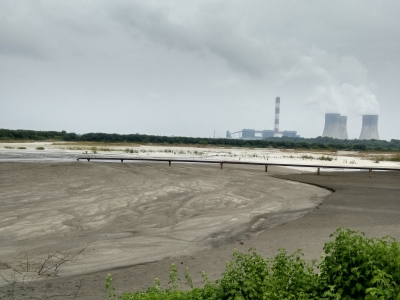New Delhi/Nagpur : , Much has been made about air pollution from thermal power plants.A Thursday study has revealed that the thermal power plants are also responsible in water pollution.
This was based on two Nagpur districts’ thermal power plant discharges, which polluted ground and surface waters.New study found that pollution was widespread in areas surrounding Maharashtra State Power Generation Company’s (MahaGenco) 2,400MW Koradi thermal power stations in Nagpur district.
Both surface water and groundwater were contaminated with harmful metals like mercury, arsenic and lithium.
Fly ash has been found to cause widespread contamination of soil, water, and air.
The study, titled “Polluted power: How Koradi and Khaparkheda thermal power stations are impacting the environment”, has shown that both plants and their ash-ponds discharge effluents into streams and rivers in the area, including the Kanhan and Kolar rivers.
Fly ash deposits have affected 18 villages in the area where the survey was conducted.
This includes water bodies, farms, open spaces, vehicles, and houses.
Centre for Sustainable Development, Nagpur, Manthan Adhyayan Kendra and Pune as well ASAR Social Impact Advisors Pvt.Ltd.conducted the study.Ltd., with the participation of the local community member.
Nearly all water samples, regardless of season, including the monsoon, did not meet the drinking water standards established by the Bureau of Indian Standards.It found that the IS 10500: 2012 (acceptable levels) as well as other applicable standards failed to be met.
Many water samples contained toxic elements such as mercury, arsenic and lithium.Exceeding the safety limits by 10-15x; high levels in turbidity and hardness (TDS), as well as total dissolved solids, were found in surface and groundwater sources.
Not only that, but the samples also contained Antimony, Boron and Fluoride, iron, manganese and magnesium, along with high quantities of Lithium Lead and Selenium.
These power plants, and the infrastructure that supports them like ash ponds have been responsible for causing pollution since a long time.
Leena Buddhe, Director of CFSD, and coauthor of this report, stated that there has been a total failure by the government to address the problem.
Terms of Reference (ToRs), have been issued by the Ministry of Environment, Forests & Climate Change for expansion of Koradi TPS units (660 megawatt).
Buddhe stated, “This is a serious concern because it will cause even more pollution.”
Shripad Dharmadhikary was co-author and coordinator of the study.Shripad said that the study revealed the extent to which the power plants of Khaparkheda and Koradi have polluted the region’s water supplies.
Although air pollution from the plants has received attention up to now, detailed analyses of water pollution were not possible.
He said that this study was probably the first to map the extent of water pollution caused by these power plants.
According to a release by the team, the study involved a questionnaire-based survey of villages around the areas and the collection and testing of water samples at surface and groundwater locations.Direct observations were also used.
The water samples came from 25 different locations, including groundwater and surface (crossing rivers such as Kanhan and Kolar), and were treated at treatment facilities.
Five locations were used to collect fly ash samples, which included ash ponds from the power plants.Detail village-level surveys of 21 villages were conducted, along with similar numbers of households and farmers.
Also, information was gathered from Nagpur’s city wards which are closer to the power stations through conversations.
Local communities are using the contaminated groundwater and surface water extensively for drinking, with and without treatment, as well as for washing and fishing.
These pollutants have been shown to cause adverse effects on both cattle and human health.This could be a serious problem for the well-being of local communities.
The spread of fly-ash has caused respiratory illness in these villagers, particularly during summer and winter.Itching and burning can be a problem during this time.
This issue has been a problem for many years,” Dr.Nikhil Bhure, a local doctor from Khasala said.
All pollution-related damages should be addressed by a local commission that includes members of the civil and community, along with independent experts.
niv/pgh #Water #thermal #Nagpur #Dist #Delhi







